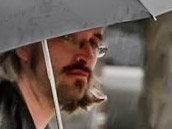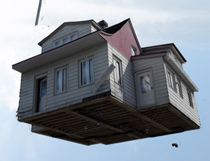Most of the poems in this book are from the perspective of the poet reflecting on language and experience (including the excellent series “the street names of toronto”) but I’d like to end this discussion by looking at one of the love poems which comes near the end of Sonnets:
her green sweater, caught in a revolving
door that reflects clouds frittering away
like flour blown off a wooden cutting
board. she looks back. she has no
shadow. thoughts of the shortness
of ant seasons, and whether omens will ever
mean what they mean before coming true.
her eyes, transparent holes in the sky.
light fades into a dusk riddled
with dim constellations and vanishes
into their unconnected dots,
like knots in a magician’s scarf.
the key to unhooking her sweater
is a tangled up, long, long time.
In this poem, the line between address to self and other are fruitfully elided while the poet plays with the perceptions of times “the shortness of ant seasons,” or “the key to unhooking her sweater is a tangled up, long, long time.” The poem also alternates between the domestic “flour blown off a wooden cutting board” and what we take as larger like the sky or omens.
Dorf insists on separating points and images deliberately set to work in a collage, in unison with each other, something else that Dorf reads as component parts? Why not enjoy the cake, and not try to divide the flour from the water from the butter from the eggs? Is such a response so simple, or even possible? In her interview with Cunningham, Martin says:
Some of the more “language-y” sonnets I’ve written are as crunchy as peanut brittle, but I’ve also written, for example, relatively accessible sonnets based on ideas and patterns from nursery rhymes and fairy tales. Considering that upwards of 90% of cognitive processes are not conscious, perhaps in a sense the poem does have a kind of will of its own, blurting out things whose meaning we can divine only after the fact, proving, as neuroscientist Michael Gazzaniga claims, that the mind is hopelessly late for consciousness.
Martin’s poems in Sonnets emerge from the shapes and sounds of collision, of how the collage becomes, and words that impact upon each other, bedevilling meanings. The pause and parse of Martin’s lines and breaks ride as an accumulative wave, with certain poems in the collection reading nearly as a single line, a complete and single breath. Although the immediate water imagery in her opening poems and the Katrina details of her biography suggest a linkage that might be difficult to avoid, perhaps it is not safe to automatically presume such simple connections. Perhaps the foundations of Martin’s poems are flooded in and of themselves, beyond the author’s control. Here is the poem Villanueva quotes in full, an untitled sonnet situated close to the end of the collection:
and if the seeds and if they sprout in the bulldozed
forest the forest where trees tall and green once
where they once where they swayed in the wind where
treetops back and forth where they waves and if the birds
drop seeds if they drop them on the razed on the vanished
woods where birds remember perches where bird nests
once perched if birds remember if they know that here
they once flew if birds drop to the bare ground if they drop
seeds if the seeds sprout in the mind of the bird if
the bird’s mind sprouts if it grows its own perch if that perch
on the sprout in the mind of the bird if the bird’s mind remembers
a nest if the eggs in that nest if they hatch if they remember
hatching little birds if the little birds fly over the forest over
the bulldozed forest if they drop seeds and if the seeds





No Comments so far ↓
There are no comments yet...Kick things off by filling out the form below.